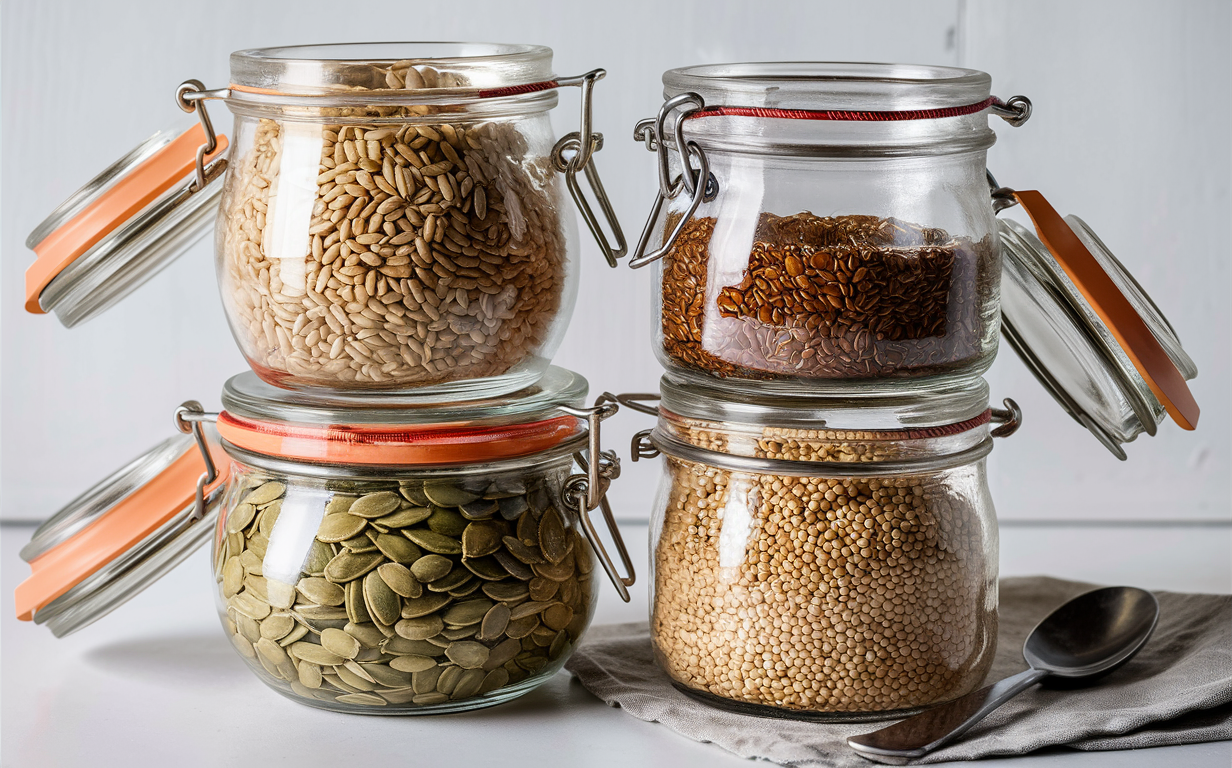
Seed Cycling: A Dietary Approach to Period Comfort.
Seed cycling has emerged as a trendy strategy for managing hormonal fluctuations and associated symptoms throughout the menstrual cycle. This article delves into the science behind seed cycling, explores its potential benefits and risks, and offers practical guidance for safe implementation.
The Rationale: Syncing Seeds with Your Cycle
Seed cycling proposes that consuming specific seeds during different menstrual phases can influence hormone regulation. Flax and pumpkin seeds are recommended during the follicular phase (days 1-14), while sesame and sunflower seeds take center stage in the luteal phase (days 15-28). Proponents believe the seeds’ unique nutrient profiles can mitigate PMS symptoms like mood swings, cramps, and acne.
Expert Insights: Potential Benefits and Considerations
While research on seed cycling’s efficacy is ongoing, some experts have observed positive outcomes in their patients. Registered dietitian Kate Morton reports clients experiencing reduced PMS symptoms, improved mood, and steadier energy levels. Additionally, naturopathic endocrinologist Jolene Brighten suggests seed cycling might be helpful for those with Polycystic Ovary Syndrome (PCOS) by regulating cycles and easing hormonal imbalances.
However, both experts emphasize that seed cycling shouldn’t be a primary treatment strategy. It can complement existing interventions but shouldn’t replace prescribed medications.
How Seed Cycling Impacts Hormones
Experts believe the unique nutrient profiles of each seed can influence hormone regulation throughout your cycle. Here’s a closer look at how each seed might contribute:
Flax Seeds:
Lignans: Flax seeds are champions when it comes to lignans, a plant compound that supports the healthy regulation of both estrogen and progesterone. These lignans help the body metabolize excess estrogen and may improve estrogen dominance, a potential contributor to PMS symptoms.
Omega-3 Fatty Acids: Flax seeds are rich in omega-3 fatty acids, known for their anti-inflammatory properties. Inflammation can disrupt hormone signaling, so these fatty acids may help create a more favorable hormonal environment. They may also contribute to healthier sex hormone and cortisol levels.
Pumpkin Seeds:
Zinc: Pumpkin seeds boast a significant amount of zinc, a mineral that plays a vital role in maintaining healthy testosterone levels. Balanced testosterone can contribute to a smoother menstrual cycle and potentially reduce period pain and bleeding, according to dietitian Kate Morton.
Magnesium: These seeds are powerhouses of magnesium, a mineral involved in over 500 bodily reactions, many of which are hormonal. Magnesium may also help regulate blood sugar levels, which can indirectly influence hormone balance.
Antioxidants: Pumpkin seeds are rich in antioxidants that can protect your ovaries and eggs from oxidative stress, potentially improving reproductive health.
Sesame Seeds:
Omega-3 Fatty Acids: Similar to flax seeds, sesame seeds are a good source of omega-3 fatty acids, aiding in managing inflammation and creating a more balanced hormonal environment.
Calcium: Sesame seeds are loaded with calcium, essential for bone health and potentially even mood regulation. Calcium may also play a role in healthy hormone signaling.
Sunflower Seeds:
Mood Boosters: Sunflower seeds are a source of iron, vitamins B6 and E, which can contribute to improved mood and potentially alleviate breast tenderness, a common PMS symptom.
Thyroid Support: These seeds contain selenium, a mineral that supports healthy thyroid function. The thyroid gland plays a crucial role in regulating hormones throughout the body.
Reproductive and Bone Health: Sunflower seeds, like sesame seeds, offer magnesium and calcium, both beneficial for reproductive health and bone maintenance.
It’s important to note that while these mechanisms are plausible, more research is needed to definitively establish the impact of seed cycling on hormone levels.sharemore_vert
Safety and Practical Tips
Seed cycling is generally safe, with the exception of seed allergies. If you have allergies to sesame, pumpkin, flax, or sunflower seeds, avoid this practice. Additionally, those with diverticulitis or inflammatory bowel disease (IBS) should consult a doctor before incorporating seeds into their diet.
For safe implementation:
Consult your doctor: Discuss seed cycling with your doctor to ensure its suitability for you.
Track your cycle: Utilize tools like ovulation trackers or basal body thermometers to pinpoint cycle phases for seed rotation.
Incorporate into your diet: Grind seeds for better absorption and add them to smoothies, salads, or yogurt. Daily intake should be 1-2 tablespoons per seed combination.
Be patient: Allow at least one to three menstrual cycles to observe potential benefits.
A Holistic Approach is Key
While seed cycling offers a promising dietary strategy, it’s not a magic bullet. Brighten emphasizes the importance of a comprehensive lifestyle approach. Maintaining a balanced diet, getting enough sleep, and managing stress are crucial for overall hormonal health.
Seed cycling can be a valuable tool to explore alongside other healthy habits, potentially leading to a more comfortable and balanced menstrual cycle. However, consulting a healthcare professional before starting is essential to ensure its safety and suitability for your individual needs.

